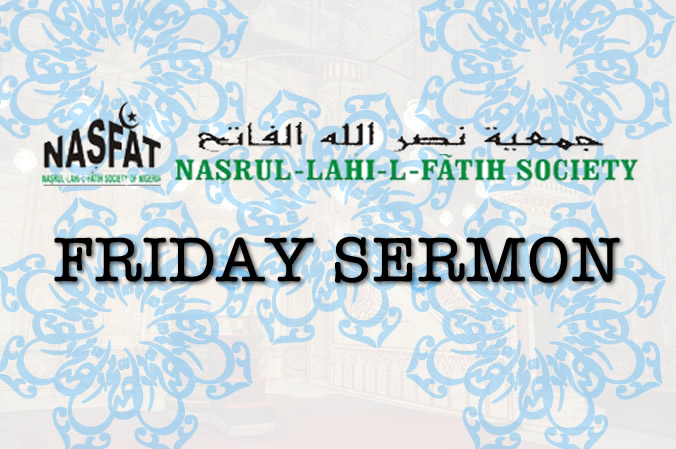NASFAT WEEKLY SERMON FOR FRIDAY, 14TH FEBRUARY, 2020

TOPIC: ISLAMIC VIEWS ON SCIENCE AND THE IMPORTANCE OF EDUCATING THE GIRL CHILD.
A’udhu billahi minash shaytaanir rajeem Bismillahir Rahmanir Raheem. Alhamdu lillaah was salatu was salamu ‘ala nabiyyil laahi Muhammad (SAW)
The 11th day of the month of February every year is the day set aside to commemorate the International Day of Women and Girls in Science. For us as Muslims, two issues stand out as the benefits from this. First is to remind ourselves of the relationship between Islam and science especially as espoused in the Qur’an. Second is to reiterate the importance our Religion,Islam attaches to the education of the Girl Child.
The International Day of Women and Girls in Science is implemented by UNESCO and UN Women, in collaboration with intergovernmental agencies and institutions, as well as civil society partners, that aim to promote women and girls in science. The day’s purpose is to promote full and equal access to participation in science for women and girls. Muslims agree that doing science is an act of religious merit, even a collective duty of the Muslim community, what is termed fard kifaayat. The astrophysicist Nidhal Guessoum argues that the Quran has developed “the concept of knowledge” that encourages scientific discovery. He writes:
“The Qur’an draws attention to the danger of conjecturing without evidence (And follow not that of which you have not the (certain) knowledge of… 17:36) and in several different verses asks Muslims to require proofs (Say: Bring your proof if you are truthful 2:111), both in matters of theological belief and in natural science.”
The acquisition of knowledge is compulsory for Muslims, both male and female. Some portions of the Qur’an that deals with science include: Q2:22,2:164,13:3,20:53-54,79:30-33.
It is instructive to note that Muslim women have contributed to science in the past and it is of essence to remind ourselves of these outstanding women and their contributions. Such women include:
1) Fatima al-Fihri played a great role in the civilization and culture in her community. Fatima inherited a considerable amount of money from her father which she used to build a mosque for her community. Established in the year 859, the Qarawiyin mosque had the oldest, and possibly the first university in the world. Students travelled there from all over the world to study Islamic studies, astronomy, languages, and sciences. Arabic numbers became known and used in Europe through this university.
2) AL-IJLIYA AL-ASTRULABI The making of astrolabes, a branch of applied science of great status, was practiced by many include one woman from Aleppo Syria), Mariam* “Al-Astrolabiya” Al-Ijliya (Al-‘Ijliyah bint al-‘Ijli al-Asturlabi), who followed her father’s profession and was employed at the court of Sayf al-Dawlah
3) SUTAYTA AL-MAHMALI Sutayta was taught and guided by several scholars including her father. She died in the year 377H/987CE. Sutayta did not specialise in just one subject but excelled in many fields such as Arabic literature, hadith, and jurisprudence as well as mathematics. It is said that she was an expert in hisab (arithmetics) and fara’idh (successoral calculations), both being practical branches of mathematics which were well developed in her time. It is said also that she invented solutions to equations which have been cited by other mathematicians, which denote aptitude in algebra. Although these equations were few, they demonstrated that her skills in mathematics went beyond a simple aptitude to perform calculations.
4) ZAYNAB AL SHAHDA Zaynab was a famous female calligrapher renowned for her work in fiqh (Islamic law) and hadiths, in addition to her husn-I khatt. She was highly praised and positioned, and was appointed as teacher of Yaqut, the last Abbasid Caliph. She spent her time studying science and literature.5) QUEEN AMINA OF ZARIA During Muslim civilisation, numerous women excelled in various fields in Subsaharan Africa. Among them was Queen Amina of Zaria (1588-1589) who came to power between 1588 and 1589. she is generally remembered for her fierce military exploits. Of special quality is her brilliant military strategy and in particular engineering skills in erecting great walled camps during her various campaigns. She is generally credited with the building of the famous Zaria wall.
6) ANOUSHEH ANSARI is an Iranian-American engineer and co-founder and chairwoman of Prodea Systems, on September 18, 2006, a few days after her 40th birthday, she became the first Muslim woman in space.
Islam will never take as important any issue except there are benefits in there for humanity and the education of the girl child and women is not an exception. Such benefits may include:
A-Educated girls are more likely to earn higher wages and therefore contribute to family income.
B- Women’s education is associated with longer life expectancy, lower infant and maternal mortality, as well as increased chance of having healthier and well-nourished children.
C-Educated women are better informed about their rights, more likely to exercise them, and more likely to participate in the formal political system.
D-Children of educated mothers, especially daughters, are more likely to receive education. Mothers’ education is the single strongest determinant of schooling for their children.
E-In Africa, women with seven or more years of schooling marry five years later than women with no education.
F-Educated women also have higher economic opportunities and choices including access to sexual and reproductive health information and services.
G-Educated women are much more likely to use family planning services and have longer intervals between births, hence having the opportunity of giving better care to their children. Among married couples, the wife’s education has a much stronger effect on family life than the husband’s.
As we commemorate this International Day of Women and Girls in Science, it is important to examine ourselves and see how well we have performed in this aspect.
We pray that Allah (SWT) will guide us and make the understanding of the deen easy for us.
UTHMAN ADEKUNLE ANIMASHAUN
Share :
